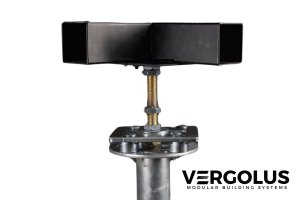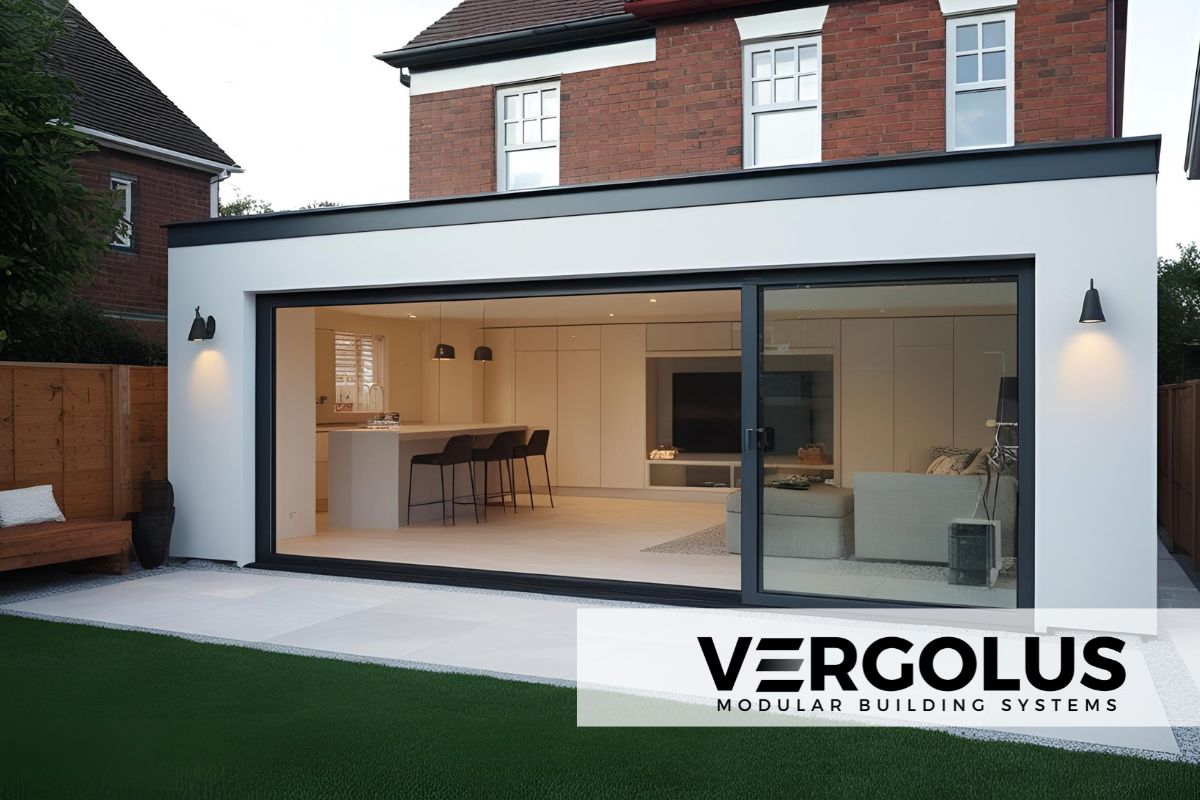House Extension Without Foundations: Is It Possible?
In the world of modern construction, innovative methods are redefining what’s possible. One common question homeowners are now asking is: Can you build a house extension without traditional foundations? The answer is yes — thanks to advanced solutions like Ground Screws and modular building technology.
At Vergolus, we specialise in providing cutting-edge modular house extensions supported by sustainable foundation systems. Our modular extensions offer a quicker, stronger, and more eco-friendly alternative to traditional builds, especially when foundations are a challenge.
Understanding Traditional Foundations
Conventional extensions require deep concrete foundations — a process that’s time-consuming, disruptive, costly, and harmful to the environment. Concrete production releases massive amounts of CO₂ into the atmosphere, contributing heavily to global carbon emissions.
Traditional foundations often involve:
-
Extensive groundworks
-
Heavy machinery
-
Significant disruption to your home and garden
-
Higher labour and material costs
Is a House Extension Without Foundations Possible?
With Vergolus Modular Building System combined with Ground Screws, the answer is yes. Instead of heavy, invasive concrete footings, we use engineered ground screws to create a durable, stable base that supports the entire structure — even on challenging or sloping terrain.
Traditional Concrete Foundation vs More Sustainable Ground Screws
-
Concrete foundations are strong and long-lasting but have a high environmental impact. Producing cement (the key ingredient) generates a lot of CO₂ emissions—about 8% of global CO₂ emissions come from cement production alone. Also, concrete foundations usually require heavy machinery, more excavation, and use a lot of natural resources like sand and gravel.
-
Ground screws, by contrast, are much more environmentally friendly. They require no digging, no concrete, and minimal disturbance to the ground. They’re made of steel (which has its own carbon footprint), but overall they use fewer resources, can often be recycled, and dramatically reduce site disruption and soil damage compared to traditional foundations.
In short:
→ Concrete = Strong but high emissions and resource-heavy.
→ Ground screws = Fast, low-impact, more sustainable choice for eco-conscious projects.
| Foundation Type | Environmental Impact | Key Features |
|---|---|---|
| Concrete Foundation | High CO₂ emissions; resource-heavy (cement, sand, gravel); extensive ground disruption | Extremely strong and durable; suitable for heavy structures; longer installation time |
| Ground Screws | Low impact; minimal ground disturbance; recyclable materials; much smaller carbon footprint | Quick installation; no excavation needed; ideal for lightweight structures and eco-friendly builds |
Why Ground Screws Are the Future
Ground Screws are galvanised steel anchors installed deep into the ground without digging or concrete. They offer incredible strength and stability, even exceeding the performance of traditional foundations.
Advantages of Ground Screws:
-
Eco-Friendly: Producing 1 tonne of cement generates approximately 1.25 tonnes of embedded carbon. In comparison, 20 ground screws (weighing only 8.9kg each) produce just 320.4kg of embedded carbon — an environmental saving of over 70%.
-
Fast Installation: A foundation system ready in just 1-2 days.
-
Minimal Disruption: No heavy excavation or destruction of your landscaping.
-
Incredible Strength: Each screw can withstand uplift and horizontal forces of over 45kN, with load-bearing capacities up to 75kN.
-
Longevity: Made from galvanised steel (BS EN ISO 1461:2009), they offer a lifespan exceeding 76 years under typical soil conditions.
At Vergolus, we also provide full site-specific load testing to guarantee the strength of the system, complete with load certification for building control authorities.

What Is Site-Specific Load Testing?
Site-specific load testing is the process of testing the ground at a particular construction site to determine how much weight (or load) the soil can safely support.
It involves applying a controlled force to the ground (using a tool like a test pile, ground screw, or plate) and measuring the ground’s response — such as settlement or movement — under that load.
This is important because:
-
Different soils (like clay, sand, gravel) behave differently.
-
Even two plots next to each other can have different ground conditions.
-
Accurate load testing helps engineers design safe and efficient foundations tailored to that exact location.
Instead of assuming that the ground is strong enough based on general soil surveys, site-specific load testing gives real-world, reliable data for your actual site.
How Vergolus Modular System Works Without Traditional Foundations
Our Steel Frame Modular Extensions are lightweight yet incredibly strong. When combined with ground screws:
-
Structures can be built on uneven or sloping land without extensive groundwork.
-
We offer ground screws up to 3m deep to ensure complete stability, even on softer soils.
-
Modular construction significantly reduces build time and site disruption.
-
Extensions are compliant with UK Building Regulations and pre-approved by building control.
Vergolus can customise frames of any size to suit your project, offering flexibility and complete peace of mind.
Where We Operate
We proudly serve homeowners across:
- London
-
Milton Keynes
-
Bedfordshire
- Oxfordshire
-
Northamptonshire
-
Hertfordshire
-
Cambridgeshire
Whether your garden is perfectly flat or on a steep incline, Vergolus Modular Systems offer the best solution.

Frequently Asked Questions (FAQs)
1. Can you really build a house extension without concrete foundations?
Yes! Vergolus uses galvanised steel ground screws to provide a stable, certified foundation without needing traditional concrete footings.
2. How strong are ground screws compared to concrete?
Ground screws can withstand horizontal and vertical forces exceeding 45kN and load capacities of up to 75kN — easily comparable to traditional foundations.
3. How deep do ground screws go?
Vergolus installs ground screws up to 3 metres deep depending on soil conditions.
4. Are ground screws suitable for sloping sites?
Absolutely. Ground screws are perfect for levelling uneven land without expensive excavation.
5. Are ground screws environmentally friendly?
Yes. They produce much less embedded carbon than traditional concrete foundations, making them a sustainable building choice.
6. How long does it take to install ground screws?
Foundations using ground screws are usually installed in just 1-2 days.
7. Can ground screws support large extensions?
Yes. Our modular system and load-tested ground screws can support a wide range of building sizes and types.
8. Is planning permission required?
Not always. Many modular extensions fall under permitted development rights. Vergolus offers a full planning advisory service.
9. What is the lifespan of ground screws?
Ground screws are galvanised to BS EN ISO 1461:2009 standards, offering a lifespan exceeding 76 years in normal soil conditions.
10. Why choose Vergolus for a modular extension?
We provide site-specific engineering, load testing, sustainable construction methods, and modular extensions tailored to your needs — quickly and cost-effectively.
Build Smarter with Vergolus
Choosing a house extension without traditional foundations is now possible — and highly advantageous — with Vergolus Modular Building Systems and Ground Screws.
Whether you’re dealing with a sloping garden in Milton Keynes or soft ground in Cambridgeshire, our innovative foundation solutions and modular technology provide the perfect way to extend your home sustainably, affordably, and quickly.
Ready to Start?
Call Vergolus at 0800 433 2353 for a free consultation.
Request your site-specific load testing and quotation today.
Build greener, faster, smarter — with Vergolus.


